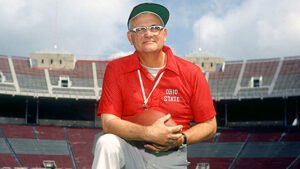
Woody Hayes: The Legendary Architect of Ohio State Football’s Glory
As the head coach of the Ohio State Buckeyes from 1951 to 1978, Hayes not only shaped a program into a national powerhouse but also left an indelible mark on college football history. His 28-year tenure at Ohio State is remembered for its fierce competitiveness, disciplined philosophy, and unmatched success.
Born Wayne Woodrow Hayes on February 14, 1913, in Clifton, Ohio, he developed a passion for football early on. After serving in the U.S. Navy during World War II, Hayes began his coaching career and quickly rose through the ranks. His big break came in 1951 when he was named head coach at Ohio State University—a move that would define an era in American college sports.

Under Hayes, the Buckeyes became a symbol of toughness, excellence, and tradition. He led the team to five national championships (1954, 1957, 1961, 1968, and a shared title in 1970), 13 Big Ten Conference titles, and an astonishing 205 victories over his 28 seasons. His teams were known for their “three yards and a cloud of dust” offense, a hard-nosed ground attack that emphasized ball control and physicality over flashy play.
Perhaps one of his most iconic seasons came in 1968, when the Buckeyes went undefeated and captured the national championship by defeating O.J. Simpson’s USC Trojans in the Rose Bowl. That squad, filled with underclassmen, became known as the “Super Sophomores,” and many went on to have distinguished NFL careers.
More than just a tactician, Hayes was a strict disciplinarian who valued education and personal development. He famously lectured his players on history and literature and demanded excellence not just on the field but in the classroom. Hayes often said, “You win with people,” reflecting his belief in character and leadership.

However, his career ended in controversy. In the 1978 Gator Bowl against Clemson, after an intercepted pass that sealed the Buckeyes’ loss, Hayes lost his temper and struck a Clemson player on the sideline. The incident led to his immediate dismissal—a sudden and dramatic end to a storied coaching career.
Despite that regrettable moment, Hayes’ legacy remains overwhelmingly positive. He produced numerous All-Americans, mentored future coaching legends like Bo Schembechler and Lou Holtz, and helped define the Ohio State-Michigan rivalry—arguably the most intense in college football.
Woody Hayes passed away in 1987, but his influence is still felt across college football and especially in Columbus, Ohio. The Woody Hayes Athletic Center stands as a tribute to his enduring impact, and Buckeyes fans continue to revere him as a titan of the sport. His contributions to football, his players, and the university are lasting proof that Woody Hayes was much more than a coach—he was a builder of men and a legend of the game.
Leave a Reply